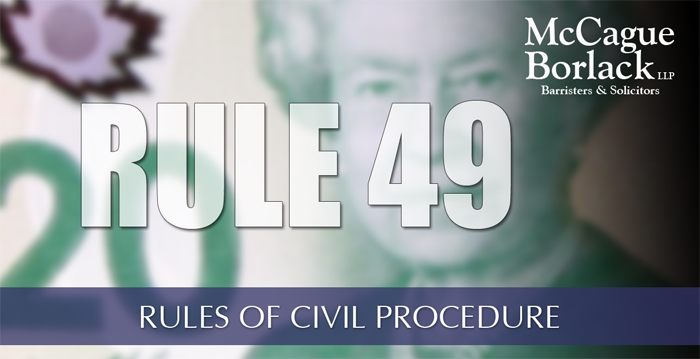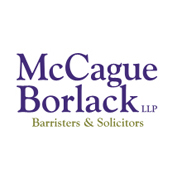All-Inclusive Rule 49 Offers
In 1985, Rule 49 of the Rules of Civil Procedure was introduced to encourage parties to make and accept reasonable offers to settle. This has had the effect of discouraging parties from delaying the judicial process and increasing costs unnecessarily. Rule 49 has had a considerable effect on litigants by virtue of the risk of a large costs award following trial.
To trigger the cost consequences under Rule 49, an offer must meet strict requirements:
- the plaintiff or defendant must make its offer at least seven days before the commencement of trial;
- the offer must not be withdrawn or expire before the commencement of trial;
- the offer must not have been accepted by the other side; and
- the judgment must be as favourable or more favourable than the terms of the settlement offer.
The offer must also be fixed, certain and capable of clear calculation in order to attract Rule 49 cost consequences.
...the burden of proving that the judgment is as favourable...is on the party who claims the benefit. |
Additionally, the burden of proving that the judgment is as favourable as the terms of the offer to settle, or more or less favourable, as the case may be, is on the party who claims the benefit.
From the inception of Rule 49 in 1985 until the Ontario Court of Appeal decision in Rooney (Litigation Guardian of) v Graham, [2001] O.J. No. 1055, Ontario courts had taken a rigid view as to whether any level of uncertainty would invalidate a Rule 49 offer. However, Laskin J.A. in Rooney provided a paradigm shift, by noting:
This "uncertainty" should not invalidate Rule 49 offers. I recognize that some courts have taken the opposite view. It seems to me, however, that in evaluating a Rule 49 offer any "uncertainty" that arises from a provision for costs should only be relevant in deciding whether the party relying on the offer has met its burden of proof under rule 49.10(3). In other words, uncertainty or lack of clarity in an offer may prevent a party from showing that the judgment it obtained was "as favourable as the terms of the offer to settle, or more or less favourable, as the case may be.”
Following the Rooney decision, the Ontario Court of Appeal reasoned in Cobb v Long Estate, 2017 ONCA 717, that although a term in a Rule 49 offer may in some measure be uncertain, it does not invalidate an offer that is otherwise Rule 49 compliant.
On its face, based on the direction of the Ontario Court of Appeal, and the certain requirements of Rule 49, an all-inclusive offer does not invalidate Rule 49.
In fact, in Hydrastone Inc. v. Clearway Construction Inc., 2015 ONSC 6358, the defendant offered to settle for $75,000 for damages and costs, plus interest. The plaintiff at trial was awarded less than the defendant's offer, however, stated that the defendant's offer was vague as it did not separate damages, interest, and costs. Justice Mew disagreed with the plaintiff's submission, stating:
[19] I do not agree that [the defendant's] offer was vague. An offer which is inclusive of costs can readily be valued once the costs have been assessed or fixed by the court. Once the Master had assessed the plaintiff's costs, applying the usual principles, it was readily apparent that the total costs fixed by her added to the principal amount resulted in an amount that was approximately $3,000 less than the defendants' offer to settle.
[20] While it may well be in a perfect world every offer to settle would be broken down in the ways suggested by the plaintiff […] any uncertainty about the amount that would accrue for costs was narrow and did not prevent the plaintiff from fairly determining whether to accept the offer to settle or proceed to trial.
Further, in Lane v. Kock, 2016 ONSC 3245, the defendants provided a Rule 49 offer to each individual plaintiff, both all-inclusive of damages, costs, and interest. Following the outcome of the trial, the defendants had provided an offer which was more favourable than the jury verdict to one of the plaintiffs, while providing an offer that was less favourable than the jury verdict to the other plaintiff. The plaintiff who rejected the offer more favourable than the jury verdict submitted that the all-inclusive Rule 49 offer should be invalidated. In rejecting the plaintiff's submission, and applying the Rule 49 costs consequences, Justice Bale held:
While in my view, all-inclusive offers are not to be encouraged, based upon the plaintiffs' analysis, I find that the defendants have met the burden of proving that the offer was more favourable than the jury verdict.
However, if a litigant does draft a Rule 49 offer with an all-inclusive sum, including damages, prejudgment interest, and costs, they bear the risk of not being able to satisfy the court that the judgment along with interest and an award of partial indemnity costs once quantified would be as favourable as the all-inclusive offer that was made.
This issue of being able to quantify an offer was specifically noted in Elbakhiet v. Palmer, 2014 ONCA 544, where the defendant did not specify the rate of prejudgment interest that would apply.
Interestingly, the Court held that the reason Rule 49 was not engaged was not due to the uncertainty of the offer, but because of how small the margin was between the defendant's Rule 49 offer and the judgment. The defendant was not able to prove that the offer was more favourable. If for example, the defendant's offer had been significantly more favourable than the judgment, the defendant may have been able to prove that notwithstanding the unspecified interest rate, it would have beat the judgment in accordance with prejudgment interest in accordance with the Courts of Justice Act.
...an all-inclusive offer does not appear to automatically invalidate Rule 49. |
Based on the foregoing, an all-inclusive offer does not appear to automatically invalidate Rule 49. However, litigants should be well aware that if they must prove their offer was more favourable than the judgment, they may face the difficulty of not being able to show that the all-inclusive sum was more favourable than the judgment.
Instead, in order to accurately provide an easy basis for comparison, an offeror should sever:
- the amount of the settlement offer itself,
- the rate of prejudgment interest to be applied on the offered amount and the period over which prejudgment interest is to be calculated, and
- costs on a partial indemnity scale, in an amount to be fixed or assessed by the court failing agreement, for all or a specified part or time period of the litigation.
Without Costs Rule 49 Offers
Where circumstances warrant, an offer of a without costs dismissal is appropriate and represents an equitable comprise. However, a question among litigants arises when a defendant makes a without costs Rule 49 offer, does that attract costs consequences after trial where a plaintiff does not recover a judgment of some value?
In the case of S & A Strasser Ltd. v. Richmond Hill, (1990), 1 O.R. (3d) 243, the Ontario Court of Appeal dealt with the disparity of awarding a plaintiff substantial indemnity costs if he or she obtained a result as favourable or more favourable than his or her offer, whereas a defendant is only entitled to partial indemnity costs if a plaintiff obtains a judgment as favourable or less favourable than the defendant's offer to settle. Justice Carthy explains what at first glance appears to be an anomaly when he stated as follows:
The answer is found in appreciating that this rule assumes that the plaintiff has recovered a judgment of some value. Without the rule, that plaintiff would normally recover party-and-party costs. The rule gives the plaintiff a bonus for an offer lower than the recovery by elevating costs to the solicitor-and-client level following the offer. The bonus to a defendant who makes an offer higher than the recovery is that the defendant pays no costs following the offer and, in addition, recovers party-and-party costs for that period of time.
Justice Carthy further stated that:
That rationale does not fit a case where the plaintiff is totally unsuccessful because, without the rule, the defendant is normally entitled to party-and-party costs. The words in the rule "and the plaintiff obtains a judgment as favourable" make it clear that the rule has no application where the plaintiff fails to recover any judgment.
As such, the Ontario Court of Appeal reasoned that if a plaintiff recovers a judgment of no value, a defendant's Rule 49 offer has no application.
However, the Ontario Court of Appeal noted that despite a finding that the without costs offer has no application to Rule 49, the court can exercise its discretion under Rule 57.01(1) to award costs on a substantial indemnity basis from the date of the defendant's offer to settle, if the defendant made an offer to settle and the plaintiff did not recover a judgment of any value after trial.
In Dunstan v. Flying J Travel Plaza, [2007] O.J. No. 4089, the defendant had made a without costs dismissal offer prior to trial. At trial, the plaintiff recovered “no judgment whatsoever”. In citing the S & A Strasser decision, Justice Smith used the Court's discretion to award costs on a partial and substantial indemnity basis to the defendant:
Again, I agree with the reasoning of Carthy J. in the S & A Strasser Ltd. decision that the court in exercising in discretion pursuant to Rule 57.01(1) may find it appropriate to award costs on a substantial indemnity basis from the date of the defendant's offer to settle, if the defendant made an offer to settle and the plaintiff did not recover a judgment of any value after trial. I therefore order that costs be awarded to the defendant on a partial indemnity basis as claimed from September 15, 2005 until its offer to settle on February 26, 2007, and on a substantial indemnity scale from February 26, 2007, until April 27, 2007.
As such, it is clear by the black letter reading of the law that a without costs dismissal offer has no application to Rule 49. However, where a defendant makes such an offer, the court can utilize Rule 57.01(1) to award the defendant its costs on a quasi Rule 49 scale.


